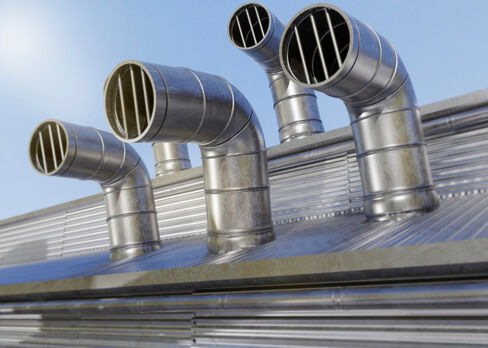
Air ducts are an essential component of your home’s heating, ventilation, and air conditioning (HVAC) system.
Over time, dust, dirt, and other contaminants accumulate inside the ducts, potentially circulating through your home’s air when the system is running. This buildup can exacerbate allergies, asthma, and other respiratory conditions. It is no surprise that many people are turning to air duct cleaning services, hoping to alleviate their symptoms and improve indoor air quality. However, a common question that arises is whether air duct cleaning truly helps with allergies and asthma. In this article, we’ll examine what air duct cleaning involves, how it may affect allergy and asthma sufferers, and whether it’s an effective solution.
Air duct cleaning is the process of removing dirt, dust, debris, and other particles that accumulate inside the ducts of your HVAC system. The cleaning typically involves a combination of powerful vacuums, brushes, and compressed air to dislodge and remove the contaminants from the ducts. Professional services often use equipment like rotary brushes, air whips, and vacuums with HEPA filtration systems to ensure that the debris is effectively removed without recirculating dust into the air.
While the focus is on the ducts themselves, air duct cleaning can also help clear other parts of the HVAC system, such as the registers, grilles, coils, and blower fans, that may be housing contaminants. The goal is to create a cleaner, healthier environment by improving the quality of the air circulating through your home.
For individuals with allergies and asthma, indoor air quality is crucial. Allergens such as dust mites, pet dander, mold, and pollen can trigger allergic reactions and asthma attacks. Poor indoor air quality can also worsen respiratory conditions, as it exposes individuals to irritants that compromise lung function.
Allergic reactions occur when the immune system overreacts to harmless substances, such as dust mites, mold spores, and pet dander. In the case of air ducts, dust and allergens may become trapped in the ducts and get released into the air every time the HVAC system turns on. If allergens are circulating through the air, it can lead to symptoms such as sneezing, coughing, itchy eyes, and a runny nose. For allergy sufferers, this constant exposure to allergens can significantly reduce their quality of life.
Asthma is a chronic respiratory condition that causes the airways to become inflamed and narrow, leading to difficulty breathing. Asthma triggers vary for each individual but commonly include dust, mold, pet dander, and tobacco smoke. If the air ducts in a home are dirty or clogged with contaminants, they can worsen asthma symptoms, leading to more frequent attacks or flare-ups.
The relationship between dirty air ducts and asthma is somewhat indirect. While air ducts themselves may not be the root cause of asthma, they can act as a conduit for harmful particles to travel through the home. For those already suffering from asthma, the presence of dust, mold, and allergens in the ducts could significantly impact their ability to manage the condition.
Given the connection between dirty air ducts and respiratory issues like allergies and asthma, it’s natural to assume that cleaning the ducts might alleviate symptoms. So, does air duct cleaning actually help in improving air quality and reducing allergy and asthma symptoms? Here’s a closer look at how it may help:
Dust is one of the most common irritants for people with allergies. It contains a mixture of particles such as dirt, skin flakes, pollen, and dust mites. As dust accumulates in your air ducts, it can easily become airborne when the HVAC system is running. By cleaning the ducts, professional services can remove much of the dust that’s circulating in your home’s air. This is especially beneficial for individuals who suffer from dust-related allergies.
© 2024 Crivva - Business Promotion. All rights reserved.